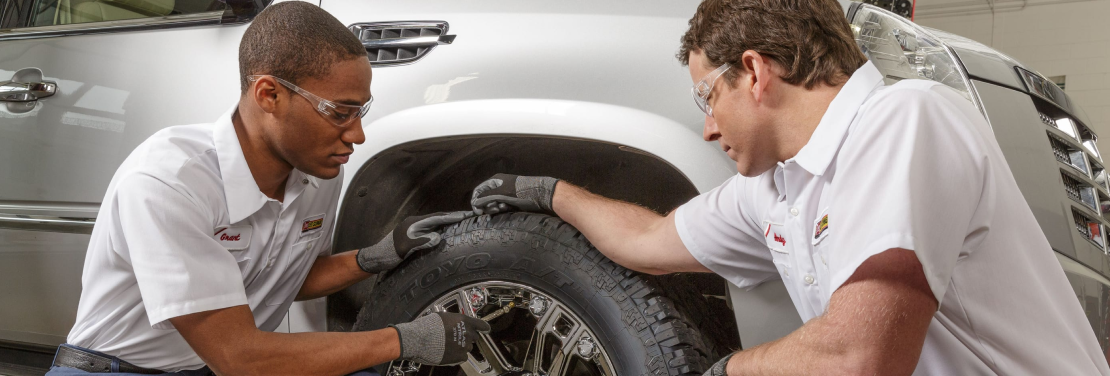Specialist Morris Tire and Alignment Providers: Ensure a Smooth and Safe Drive
Specialist Morris Tire and Alignment Providers: Ensure a Smooth and Safe Drive
Blog Article
Tire Solution: The Impact of Weather
When it comes to making sure ideal efficiency and safety on the roadway, comprehending the effect of climate condition on tire solution is vital. From scorching warmth to icy roads, each climate component can considerably affect tire functionality and general driving experience. By diving into the effects of differing weather problems on tires, drivers can get beneficial insights that might boost their lorry's efficiency and longevity. In this discussion, we will discover the intricate partnership between weather and tire solution, clarifying the relevance of weather-specific tire upkeep practices and factors to consider.
Warm and Tire Efficiency
When exposed to high temperature levels, tires experience changes in efficiency that can significantly affect automobile safety and security and handling. The heat created from extended driving or warm weather conditions causes the tire rubber to soften, causing reduced tread life and boosted wear. As the rubber ends up being softer, the tire's grasp when driving diminishes, impacting braking distances and general grip. In severe instances, too much warm can even trigger tire blowouts, posturing an extreme security threat to the vehicle and its occupants.
Moreover, heats can speed up the process of tire aging, triggering the rubber to weaken much more swiftly. This can cause splits, protrudes, and other forms of damage that jeopardize the structural stability of the tire. To reduce the effects of heat on tire performance, chauffeurs must on a regular basis examine their tire pressure, revolve tires to make sure even wear, and examine for any type of indications of damages. In addition, utilizing tires specifically created to hold up against high temperature levels can assist maintain optimal performance and security on the road.
Cold Weather Impacts
Cold weather problems can have a substantial influence on tire efficiency and safety. In cold climate, tires might also lose air pressure more quickly, which can influence handling and fuel efficiency.
To minimize the effects of chilly climate on tires, it is essential to regularly examine tire pressure and inflate them to the maker's suggested degrees. Making use of winter or all-season tires made for winter conditions can also improve traction and hold on icy or snowy roadways - discount tires morris il. Proper tire upkeep, consisting of normal examinations for wear and damages, comes to be a lot more essential throughout cooler months to make sure ideal performance and security
Rainy Conditions Impact
During stormy conditions, tire performance and safety and security can be dramatically influenced by the wet roadway surfaces and decreased presence. The walk pattern of tires plays a vital duty in preserving grip on damp roads. Tires with damaged footsteps are more susceptible to hydroplaning, where a layer of water builds up between the tire and the roadway surface, resulting in loss of grip. To battle this, chauffeurs must consistently inspect their tires for sufficient walk deepness and consider investing in tires particularly created for damp conditions.

Snow and Tire Security
When driving in snowy problems, having the best tires can make a significant distinction in security and performance. Winter months tires are developed with unique rubber compounds and step patterns to supply better grip on snow and ice compared to all-season tires.
Along with using winter months tires, it is essential to ensure they are properly blown up. Cold weather can create tire pressure to go down, impacting grip and handling (morris tire and alignment). Regularly inspecting and maintaining the appropriate tire stress is important for ideal efficiency in snowy conditions

Weather-Related Tire Upkeep
When faced with various weather, appropriate tire maintenance ends up being a crucial facet of lorry safety and efficiency. Weather-related tire upkeep encompasses a range of techniques focused on making certain ideal tire function and long life in various weather situations. One essential aspect of weather-related tire upkeep is tire pressure law. Rising and fall temperatures can cause tire stress to vary, influencing useful reference traction and gas performance. Consistently inspecting and adjusting tire stress according to maker recommendations is crucial for secure driving in altering climate condition. Furthermore, tire walk deepness plays a considerable function in dealing with various climate aspects. Tires with adequate step depth supply far better grip on damp or icy roadways, minimizing the risk of hydroplaning or skidding. When step wear reaches a certain depth is crucial for keeping grip and stability in adverse climate, evaluating tire step on a regular basis and changing tires. By focusing on weather-related tire maintenance, motorists can boost safety and security, improve car efficiency, and extend the life-span of their tires.
Conclusion
In verdict, climate conditions have a significant influence on tire performance and safety and security (tires morris il). From warm affecting tire stress and use to cool weather condition reducing traction, it is crucial to think about the climate when preserving and making use of tires.
In this conversation, we will check out the elaborate partnership between weather condition conditions and tire solution, shedding light on the value of weather-specific tire maintenance methods and factors to consider.

Report this page